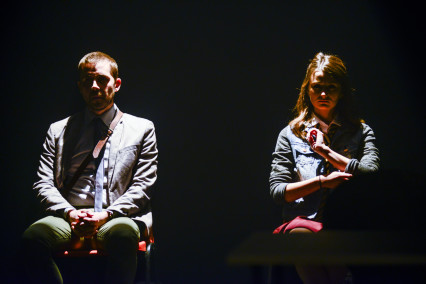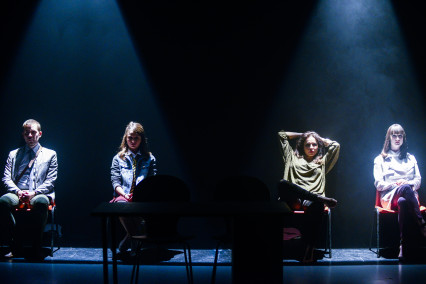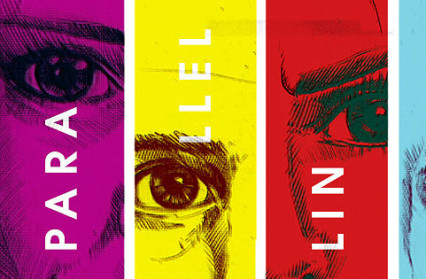As Wales’ foremost fringe theatre company, Dirty Protest, begins its first ever touring production with the award-winning play Parallel Lines, Wales Arts Review caught up with the director, Catherine Paskell, and the writer Katherine Chandler, just as the tour was about to open in Cardiff’s Chapter Arts Centre.
Gary Raymond: Firstly, congratulations on the first ever Dirty Protest Welsh tour. Can you talk a little bit about how the tour came about?
Catherine Paskell: We produced our first full-length new writing production in 2013 – and that was Parallel Lines. The script had won the Wales Drama Award back in 2012, and so it had been judged to be the best play in Wales, by a panel of people who know what they are talking about. So we thought, if no one is producing it, and this is the best play in Wales, what does that say about new drama in Wales? Dirty Protest are dedicated to producing, developing and promoting new writing and writers in Wales – so we thought the best way to do this was to produce the play.
The first production had fantastic success: audiences loved the story of Steph and her mother Melissa, and how their lives collided with her teacher, Simon and his wife, Julia. We had great reviews and the show went on to win Best Production in the English Language (Critics Choice) at the Theatre Critics of Wales Awards in 2014. The script also went on to be a finalist in the international award for new drama: the Susan Smith Blackburn Prize (2015). There were calls to tour the play. But Dirty Protest and Katherine Chandler, both of us wanted to stretch ourselves. We weren’t content to tour an existing show. And there was still a story in there that Kath wanted to explore further.
So we decided to R&D the script – Kath ended up throwing the original script away. She re-wrote it. We threw away the set – the 2 kitchens are no longer there. It was re-developed, re-conceived and interpreted in a whole new bold, physical way. We are really proud of the journey the play has been on and we hope audiences will enjoy the new version.
Kath, Could you tell us a little bit about where the original idea came from?
Katherine Chandler: It’s from my life really, two worlds kind of colliding and judging each other. I’m from a working class family and I work and spend a lot of time in an industry that primarily isn’t that, so it was interesting to me how both worlds behave towards each other.
 And how much have you changed as a writer since Parallel Lines was first staged?
And how much have you changed as a writer since Parallel Lines was first staged?
KC: I don’t think the core of me has changed much at all really. I know what I do and I know why. The stuff that’s changed is all about becoming more educated in things like structure and form, all the boring stuff, which comes with experience really. I now know who Simon Stephens is and Ibsen and I’ve read a bit of Shakespeare and I’ve done some workshops with the BBC about how you write a story, things like that.
How important is it and has it been to work with Dirty Protest?
KC: I did a few shorts nights with them before I got my first production and I think they’re invaluable. Just to have your work on its feet with great actors is such a useful tool for new writers. Tim has always been a big support to me and I value and respect that. When I won the Wales Drama Award, I really wanted this play to stay in Wales and Catherine and Dirty Protest felt the same. It felt very natural that it was produced by Dirty Protest and Catherine was really committed to the play, she got it funded and has really championed it.
What was it that suggested Parallel Lines would be the first touring production?
CP: We wanted to tour something good. And developing a new play takes time and resources. Parallel Lines was a developed play that had been well-received. But we didn’t just want to tour the same play, we wanted to push ourselves and treat the audiences of Wales with an even better version of an already great play. Parallel Lines is now even better, and it’s the story that Kath really wanted to tell this time around. It’s no longer just focused on Steph and her story: it explores the journey of the other three characters with more depth. It has taken Parallel Lines 3 years to develop into the version you will see on this tour, and sometimes that’s how long great drama takes to develop. We are well known for our short play nights, but to develop writers and truly great writing, playwrights need support, time and resources to develop fantastic, entertaining, thrilling stories and experiences. We think this gives an important message to get out there. As a project-funded company, Dirty Protest have been leading the way in Wales, working with over 200 writers since 2007 to develop new plays across our nation. We have ambition for writers and audiences, we don’t want them to suffer stale, dull or worthy shows. This tour is a celebration of how vibrant and exciting and enjoyable and moving new drama can be.
Kath, how much have you changed, as a person and as a writer, since you first wrote it? And how much has that fed into the new development?
KC: Well, I’m older! Writing isn’t as confusing to me as it used to be and I’m much quicker to know what’s working and what isn’t and what I need to do. I’m generally more confident in what I do, less worried and more realistic about the profession.
Cath mentions how much the character of Steph has changed since the first staging…
KC: Steph has completely changed because she’s been rewritten and it’s set at a different time. The original play started around three months after the event but this play starts on the day it happens so that means that Steph is in a different place and not quite reached superhero status yet. But all three women are strong, vital characters and definitely in my opinion would make amazing superheroes.
The original Parallel Lines was heavily workshopped in rehearsal – did you develop this new version under similar methods?
CP: Yes – because we also stripped away all the set, and created a stark “setless” environment, it was like devising in a vacuum. But the script was our backbone: the intentions and thoughts of the characters, and the story, are all there for us to play with. The cast are very imaginative and we used workshopping and game techniques to create our physical world.
 KC: It had a week of workshop for both productions, which was about hearing it with a group of actors and playing with the physicality. At the time I was looking at mashing up the dialogue and characters and challenging formal structures but it was a bit random and totally confusing and somewhere in amongst the chaos of that we lost the simplicity of the story. Workshops are useful and I value them more now than before because I usually know what I want from them. In some productions they might happen at the very start of the process, others can come later but you have to be at the right stage of the writing process for them to be helpful. I have always loved working with actors and our Parallel Lines actors have been so key to the success of the show. These are big roles with lots to say and lots of physicality and our actors have worked so hard and with such commitment, throughout the workshops and rehearsals.
KC: It had a week of workshop for both productions, which was about hearing it with a group of actors and playing with the physicality. At the time I was looking at mashing up the dialogue and characters and challenging formal structures but it was a bit random and totally confusing and somewhere in amongst the chaos of that we lost the simplicity of the story. Workshops are useful and I value them more now than before because I usually know what I want from them. In some productions they might happen at the very start of the process, others can come later but you have to be at the right stage of the writing process for them to be helpful. I have always loved working with actors and our Parallel Lines actors have been so key to the success of the show. These are big roles with lots to say and lots of physicality and our actors have worked so hard and with such commitment, throughout the workshops and rehearsals.
For the new production, I chose to rewrite the play and knew exactly where I wanted to take it. I think I was so clear with the rewrite because of experiencing what didn’t work in the last production. And time. It was that simple really. I just had time to think and reflect.
When Catherine suggested they retour it, I said I wanted to rewrite it and didn’t want a naturalistic production of it because I just felt like I needed to have a reason for why we would do it again.
On a new piece of work I’m generally in and out of rehearsals for the first few days/week and then I will watch a few runs and give a few notes!
You’ve said that Parallel Lines has a ‘Cardiff voice’ – how do you think that will move around Wales?
KC: I can’t remember saying that? ….
I guess in the same way that Shirley Valentine has a Liverpudlian voice and yet spoke to women up and down the country? It’s got a Cardiff voice cos that’s where I’m from and that’s how I write. My play, Before it Rains, had a Cardiff voice and was read in New York and Texas; my Manchester RX play Bird has a Cardiff voice.
Taking that literally and talking about our work being true to where it’s from is really vital, I think. I was really proud to hear Rhys Ifans Welsh accent on the stage of the National Theatre in Tim’s Protest Song. And I’m really excited that Sophie Melville will be taking Gary’s Iphigenia to the National in all its Cardiffian glory. It’s really important for our voices and accents to be heard and not apologised for, especially when they are saying important things.
CP: Dirty Protest itself has a Cardiff voice, of course, in that for the longest time, all of us who made up the company were based in Cardiff. We knew it was important that our short play nights, that are held in pubs and clubs and unusual spaces, felt like they were for people in Cardiff and by people in Cardiff. Over time, this has expanded and spread across the whole of Wales. We already work with writers from across the nation and have produced many events in collaboration with venues and writers all across Wales. It’s the authenticity of our voice that struck a cord with people. It is our passion and dedication and integrity that continues to drive people to want to connect with us, and for us to want to connect with them. That reciprocal friendship between us, and writers and artists, is very important. As is working with new people (we always make sure our shorts nights have a mixture of established AND emerging writers on the same bill, and that our cast is a mixture of people we have worked with before and newbies). As such, as always have a social element to our shows and hang out in the bar after all our events to make sure we can meet as many writers, actors, directors, and artists and theatre colleagues as possible.
Dirty Protest is about community, so we want to reach more writers across Wales and expand the footprint of new writing, to engage more audiences to see exciting new writing for theatre. So we talked to venues all across Wales, who were keen to book us and Parallel Lines, because the play had so many accolades.
Alongside the show, we created a parallel programme of our well-loved shorts nights to tour just before the production, and our crack team of writers, directors and actors have just finished touring to each venue. In each place they have worked with local writers to develop their skills, create new plays and then rehearse those plays ready for a performance that same night. The workshops have gone brilliantly, and we worked with writers aged 16 – 89 years old. Many of these people were professional playwrights and many were first time writers, who had never written a play before. We were so excited to meet so many brilliant writers all over North, South, West and Mid Wales and look forward to having even more people in the future join our Dirty fold.
Cath, as director, how has it been coming to an award-winning play? And how have you put your own stamp on it?
CP: It means the script is great. It’s a fantastic building block. Our own stamp is that is could read as a “naturalistic” play, but we have turned that on its head. It’s loud. It’s physical. It’s been staged through a collaborative process that has completely intertwined the performers and set, sound and lighting designers. There will never be another production that looks and feels exactly like this one of Parallel Lines, because the creatives that have come to it this time around have put so much of their own DNA into it, that this couldn’t be replicated by someone else.
You mention a little about the new staging; can you tell us a bit about that?
We threw away the kitchen sink. We literally threw away the sinks. We are a sinkless production. There is physicality and sound and light. There is non-naturalism. There is heart and soul and guts.
Kath, you said in 2012 that it was an important time in Welsh theatre – how do you view the landscape now – and were you right back then?
KC: How long have you got?
I think there have been some really positive changes. Sherman is making some great theatre, The Other Room has exploded onto the scene with some brilliant new work, Clwyd, Theatr NaN’og, Torch, Welsh College, Millennium Centre and exciting smaller companies making extraordinary work. Everyone seems proactive in getting their work made. We still have a way to go but I think what’s been brilliant about the last five or so years is that we have the artists poised and ready to lead the way culturally into the future. It’s all about the funding now and getting the right money to the right places and being consistent with it.
Who knows if I was right????
And, Cath; how does it look for directors?
CP: The future looks bright. There is a whole load of enthusiastic young things coming up and I cant wait to see what they create over the coming years. We also have a gang of talented mid-career directors who are making their own work happen and supporting each other to do that. What we need is more investment in order to turn Wales into a producing hothouse and inspire our communities, people across the UK and internationally.
Parallel Lines is on tour now. For more info click here.
Photo credits: Kirsten McTernan



 Enjoyed this article? Support our writers directly by buying them a coffee and clicking this link.
Enjoyed this article? Support our writers directly by buying them a coffee and clicking this link.







